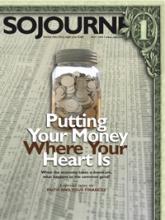I grew up as the daughter of a Cherokee mother and a Swedish father. The Christian teachings of my childhood and the deeply infused way of being in the world I experience as an Indigenous person shape my understanding of economics—and of what is possible. In the United States, we interact daily with an economic system that undermines basic Christian values of concern for the poor and love of one’s neighbors and violates Indigenous values of harmony, balance, and reciprocity within creation. Individualism, greed, and overconsumption are fear-based responses that deny the abundance provided by the Creator.
For centuries, Indigenous Peoples have infused our individual and collective economic activities with the moral frameworks that flow from our spiritual values. Increasingly, such holistic approaches to the marketplace are becoming the touchstone of new investment strategies for all people.
For example, in the 1980s the Pine Ridge Reservation in South Dakota—home to the Lakota People—was the poorest county in the U.S. Dollars that flowed into Pine Ridge quickly left the community, heading for non-Indigenous businesses in border towns. Seeking to disprove the conventional belief that poor people made poor customers, Lakota leaders began a survey to understand the economy of their community.
Read the Full Article
